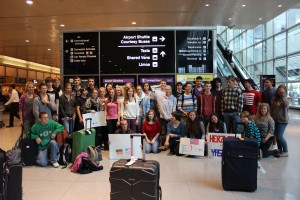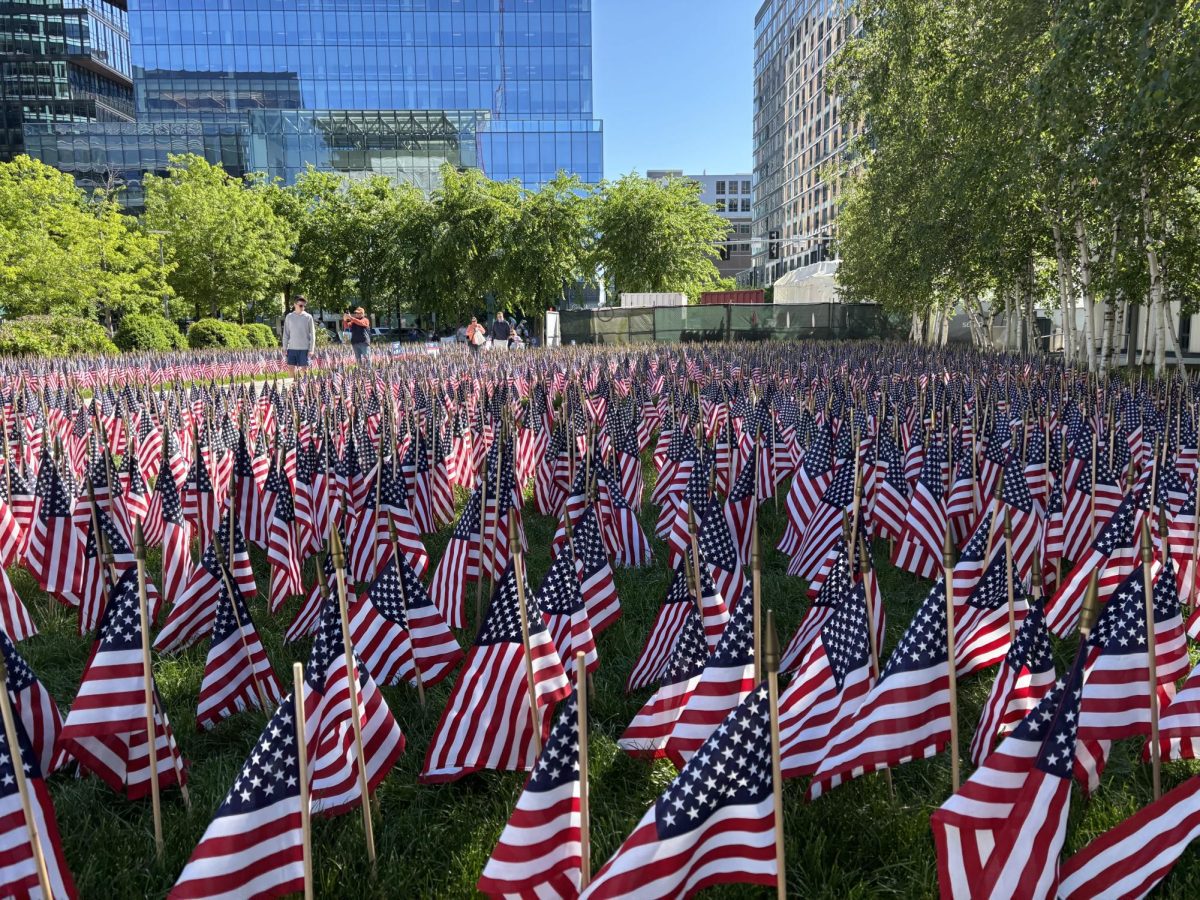
The typical American family vacations domestically, whether it be the droves who search out more temperate climates to escape the cold that accompanies the holiday season, or the Americana-pilgrims who trek to see the significant sites the nation contains. The Grand Canyon in Arizona, the bustling cultural and financial hub of New York, the capital in Washington and its many monuments and government buildings; all provide the American vacationer with an expanded view of their nation’s culture and history.
But in a world where the previously scrutinized importance of national identity seems to be in decline, the American vacationer can no longer avoid a coming obligation to understand not only the vast diversity of their own nation, but the world as a whole.
Exchange programs, like the programs Walpole High School provides, have allowed students to experience foreign culture on a level their parents are probably quite foreign to themselves. China, France, Germany and Costa Rica are among the many nations Walpole High sends students to for cultural enrichment and perfection of their speaking ability in the local toung.
Recently, Walpole High participated in its biannual German exchange, hosting students from the small town of Ingelheim, located in southwest Germany just south of Mainz. It began in Logan Airport, on a serene February day. A group of American students stood awkwardly shuffling as the plane arrived in the mid-afternoon. I myself was among the American students anxiously awaiting their exchange partner, unsure of what to expect.
We all stood, laughing and joking about our expectations of the exchange. We barely knew eachother, let alone the German students who were about to arrive in less than ten minutes. Droves of tourists and people on business flew out of the terminal, toting suitcases and wheel-along coach bags. Valets stood holding signs with names. The outcries of joy as friends and family reunited sounded throughout, but still we waited. Finally, a large group of teenagers poured out all at once. Frau Weber, a familiar face from the previous exchange, stood at the vanguard of the group. Behind her, our guests for the next two weeks followed.
Their fashion was notably different. Scarves, usually unseen at Walpole High, especially by boys, were worn by almost all of the exchange students. Their clothing was all around well composed and stylish. Some were quite short, some intimidatingly tall. The difference in culture was illustrated by our conflicting physical appearances. Most of the Walpole High students were clad in sweat pants or jeans, displaying a more casual approach to style on this particular day. To us, their nationality wasn’t the only foreign aspect of the group. Amongst the group, a few towering students loomed above the rest.
One of these was my exchange partner Daniel. Daniel and I had arranged to participate as exchange partners because his sister had been on the previous exchange and became a good friend of mine. We had communicated via Facebook, posted comical links and even tried to Skype (unsuccessfully), but still the first meeting was awkward. We shared pleasantries and began to strike up a brief conversation, only to be broken up by Mrs. Pierce, the American organizer of the exchange and the German teacher at Walpole High, gathering all of the students to get together for a group picture.
We departed from the airport and made our way back to the house. We talked about our daily lives and interests in America and asked him about his in Germany. Daniel’s father is the Co-Editor in Chief of the National German News Network and an expert on terrorism, a topic that peaked our interest because of its relevance in America today. He described his interests in mathematics and computer science, as well as politics and history. He was aware of the pending election, and shared his views about the political goings-on in America, declaring himself an Obama supporter, much to the disdain of my father, a fiscal conservative. The political differences would create interesting conversation, or rather fervent debate, later on. I knew of the Eurozone crisis and Germany’s important role in trying to soothe it. I was familiar with Angela Merkel and some of the political goings on in Europe. Both parties were surprisingly well-informed on the other’s political atmosphere.
The first day was rather unremarkable. There were tours of the house and gift giving, but it was mainly a time to discuss places we intended to visit and to get an idea of what Daniel liked to eat.
School was another story. Practically every student who crossed my path acted like an anti-body, immediately sensing the foreign presence and staring at him as he walked by. School was constantly in a rush. In Germany, lunch is a 45 minute block where students may leave and go elsewhere to eat. Class numbers vary day to day, requiring the student to stay later or even ending their day in the late morning. Daniel was unfamiliar with the militant precision of the five minute intervals between classes, or the 25 minutes we had to eat. The PLC Tuesdays threw him off, just as he seemed to be understanding the weekly and daily schedules.
Teachers politely introduced the exchange students to the rest of the class upon meeting them. Daniel loved Mr. Jean’s International Relations class, for not only for the diverse array of topics covered in class but the unorthodox method in which Mr. Jean teaches his courses, using a vast arsenal of humorous ways in which to teach the subject matter.
Days in the exchange went by in a similar manner to the first, going unchanged but briefly interrupted by the Germans heading off to New York for a week. Towards the end of the exchange however, I noticed that a change had taken place. “It seemed like all of a sudden, I was joking and getting along with my German student better than ever. I didn’t even notice, but it seemed like we were really good friends, rather than just exchange partners.” said senior Laura Drinan, another American student who participated in the exchange. Laura, like myself, participated in the previous exchange. “In the first exchange, I remember thinking, this is going to be really awkward, and I just thought it would be like that the entire time.”

“But surprisingly, it wasn’t like that. We actually ended up getting along really well. I felt like I understood more about where she was coming from, and she understood me too. The exchange really opened my eyes, and I made a friend in the process. It was great.” And it was just as enlightening and enjoyable the second time around as well. Daniel got to see historic Boston, the Aquarium, and even a few sports events. All the while, Daniel and I discussed things of mutual interest, mostly Morgan Freeman’s “Through the Wormhole” and the then-undecided election. We joked and got along swimmingly, for lack of a better term.
And so, as the three week exchange drew to a close, I began to see that not only were we finding out more about each others country, but we were finding out more about these kids we exchanged with. The “foreign” aspect of their nationality and fashion so noticeable upon our first impression wasn’t present in their character as human beings. Walls between us were broken down just like when the Berlin Wall came crumbling under David Hasselhoff’s victory dance in November of 1989. The exchanges true meaning presented itself to me, and now the trip over to the deutsche Stadt, some eight hours away by plane, doesn’t seem like too daunting of an experience.








